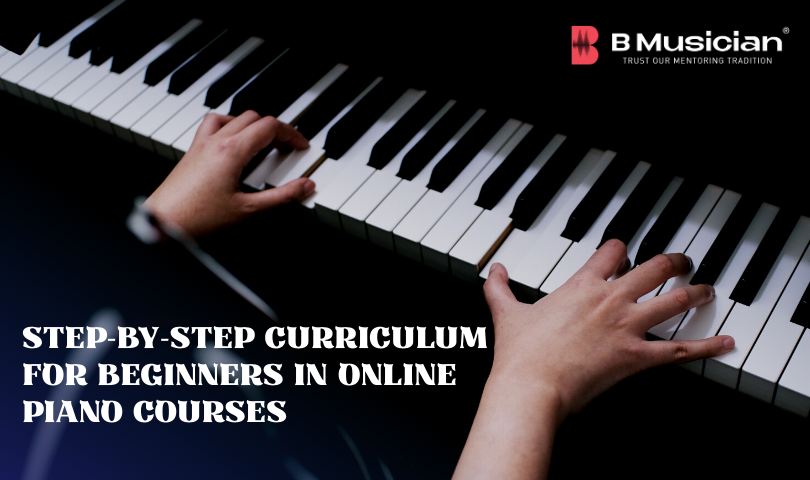Introduction
Learning piano as a beginner requires a structured, methodical approach that builds skills systematically while maintaining engagement and motivation. A well-designed online piano course for beginners provides the roadmap necessary for developing comprehensive piano skills from the ground up. Modern digital piano education has revolutionized how beginners approach this magnificent instrument, offering structured curricula that combine traditional pedagogical methods with innovative technology to create learning experiences that are both thorough and accessible. Understanding the step-by-step progression used in quality online piano lessons helps prospective students choose programs that will deliver consistent results and long-term musical satisfaction.
Learning piano through structured programs becomes even more accessible today, especially for those searching for effective ways to learn piano online with guided progression.
The Importance of a Structured Curriculum in Online Piano Lessons
Building Solid Foundations
Online piano classes with well-structured curricula ensure that beginners develop proper technique from the outset, preventing bad habits that can limit progress and cause physical discomfort later in their musical journey.
Progressive Skill Development
The best online piano lessons follow carefully sequenced progressions that introduce new concepts only after mastering previous skills, creating a solid foundation for advanced piano playing.
Maintaining Student Motivation
Quality online piano training incorporates achievable milestones and recognizable pieces that keep students engaged while building essential skills through systematic instruction.
Comprehensive Musical Education
Structured online piano lessons for adults address not only technical skills but also music theory, sight-reading, ear training, and musical expression, creating well-rounded musicians rather than just piano players.
Phase 1: Foundation Building (Weeks 1-8)
Getting Started: Piano Basics
Instrument Familiarization
- Piano Anatomy: Understanding keys, pedals, and basic piano construction
- Proper Seating: Correct bench height and distance from the piano
- Hand Position: Natural hand shape and finger curvature
- Basic Posture: Maintaining healthy alignment while playing
Initial Finger Exercises
- Five-Finger Patterns: Simple exercises using thumb through pinky
- Finger Independence: Developing control of individual fingers
- Basic Coordination: Simple two-hand exercises
- Relaxation Techniques: Avoiding tension and strain
Music Reading Fundamentals
Staff Notation Introduction: An effective online piano course for beginners introduces reading gradually:
- Treble Clef: Right-hand notation and basic note recognition
- Bass Clef: Left-hand notation and lower register reading
- Middle C: Central reference point for both hands
- Basic Rhythms: Quarter notes, half notes, and whole notes
Simple Pieces and Exercises
- Familiar Melodies: “Mary Had a Little Lamb,” “Twinkle Twinkle Little Star”
- Basic Scales: C major scale with proper fingering
- Simple Duets: Teacher-student pieces for musical interaction
- Technique Building: Hanon-style exercises adapted for beginners
Basic Music Theory
Fundamental Concepts Quality online piano classes integrate theory naturally:
- Note Names: Understanding letter names and keyboard geography
- Time Signatures: 4/4 time and basic beat counting
- Key Signatures: Introduction to sharps and flats
- Intervals: Basic understanding of steps and skips
Phase 2: Skill Expansion (Weeks 9-20)
Technical Development
Advanced Fingering Patterns As students progress in online piano training:
- Scales and Arpeggios: Major scales with proper fingering
- Hand Positioning: Smooth hand position changes
- Pedaling Introduction: Basic sustain pedal technique
- Dynamic Control: Playing soft and loud with consistent tone
Coordination Challenges
- Independent Hands: Different rhythms in each hand
- Melody and Accompaniment: Right-hand melody with left-hand chords
- Phrase Shaping: Beginning musical expression concepts
- Tempo Consistency: Playing with a steady pulse
Expanding Repertoire
Classical Foundations The best online piano lessons include essential classical pieces:
- Bach Minuets: Introduction to Baroque style and ornamentation
- Mozart Sonata Movements: Classical period phrasing and form
- Chopin Waltzes: Romantic expression and pedaling
- Method Book Pieces: Progressive pieces designed for skill development
Popular Music Integration
- Contemporary Songs: Arrangements of popular melodies
- Lead Sheet Reading: Basic chord symbol interpretation
- Accompaniment Patterns: Simple left-hand accompaniment styles
- Personal Favorites: Student-chosen pieces for motivation
Music Theory Expansion
Harmonic Understanding Advanced online piano lessons introduce:
- Basic Chords: Major and minor triads
- Chord Progressions: I-V-I and other fundamental progressions
- Circle of Fifths: Key relationships and scale construction
- Roman Numeral Analysis: Understanding chord functions
Phase 3: Intermediate Development (Weeks 21-40)
Advanced Technical Skills
Complex Coordination Intermediate online piano course for beginners (now progressing to intermediate):
- Polyrhythms: Two against three and other complex ratios
- Advanced Pedaling: Half-pedaling and artistic pedal use
- Voicing: Bringing out melody while controlling accompaniment
- Articulation: Staccato, legato, and mixed articulations
Performance Techniques
- Memorization Strategies: Analytical, visual, and kinesthetic memory
- Performance Preparation: Dealing with nervousness and stage presence
- Recording Techniques: Home recording for self-evaluation
- Ensemble Skills: Playing with other musicians or accompaniment tracks
Style Exploration
Genre Diversification Quality online piano lessons for adults explore various styles:
- Jazz Fundamentals: Basic jazz chords and swing rhythm
- Blues Progressions: Twelve-bar blues and blues scales
- World Music: Folk songs and cultural musical elements
- Contemporary Styles: Pop, rock, and modern commercial music
Improvisation Introduction
- Chord-Based Improvisation: Creating melodies over chord progressions
- Scale-Based Improvisation: Using major and minor scales creatively
- Style-Specific Improvisation: Blues, jazz, and contemporary approaches
- Creative Expression: Developing personal musical voice
Advanced Music Theory
Sophisticated Concepts Advanced curriculum in online piano training includes:
- Extended Chords: Seventh, ninth, and altered chords
- Modulation: Key changes and transitional techniques
- Form and Analysis: Understanding musical structure
- Compositional Techniques: Basic principles of musical composition
Phase 4: Advanced Application (Weeks 41-52+)
Professional-Level Skills
Advanced Repertoire The curriculum in the best online piano lessons culminates with:
- Advanced Classical Works: Intermediate sonatas, inventions, and character pieces
- Technical Studies: Czerny, Hanon, and other technical development pieces
- Contemporary Literature: Modern composers and 20th-century techniques
- Personal Specialization: Focusing on preferred genres and styles
Performance Mastery
- Recital Preparation: Preparing and presenting formal programs
- Competition Readiness: Skills for piano competitions and auditions
- Collaborative Skills: Accompanying singers and other instrumentalists
- Teaching Preparation: Understanding pedagogy for sharing piano knowledge
Creative and Professional Applications
Composition and Arrangement
- Original Compositions: Creating personal piano pieces
- Arrangement Skills: Adapting music for piano from other sources
- Lead Sheet Realization: Creating full piano arrangements from chord charts
- Transcription Skills: Learning music by ear and notating it
Technology Integration
- Digital Audio Workstations: Recording and producing piano music
- Music Notation Software: Professional score preparation
- Online Performance: Streaming and virtual recital presentation
- Social Media Integration: Sharing musical progress and performances
Why BMusician Excels in Online Piano Course for Beginners
Comprehensive Structured Curriculum
BMusician’s online piano lessons follow a meticulously planned progression that ensures each skill builds naturally upon previous learning. The curriculum has been developed by experienced piano educators who understand both traditional pedagogical principles and the unique opportunities that digital learning provides.
Expert Piano Instructors
The platform features accomplished pianists who specialize in beginning instruction and understand how to adapt traditional teaching methods for online delivery. These instructors bring extensive performance experience and proven pedagogical expertise specifically adapted for digital learning environments.
Advanced Learning Technology
Innovative Online Platform Features:
- High-Definition Video Streaming: Crystal-clear instruction showing precise finger technique and hand positions
- Multiple Camera Angles: Comprehensive views of keyboard technique from various perspectives
- Interactive Practice Tools: Built-in metronomes, recording capabilities, and progress tracking
- Customizable Learning Pace: Self-paced modules combined with live instruction for optimal learning
Personalized Learning Approach
Adaptive Instruction Methods:
- Individual Assessment: Regular evaluation of progress and adjustment of curriculum pacing
- Personal Goal Integration: Incorporating student interests and objectives into lesson planning
- Flexible Scheduling: Accommodating various lifestyles and time commitments
- Multiple Learning Formats: Live sessions, recorded lessons, and self-study materials
BMusician’s Piano Course Structure
Beginner Foundation Level
Core Curriculum Components:
- Piano Fundamentals: Posture, hand position, and basic technique establishment
- Music Reading: Systematic introduction to staff notation and rhythm reading
- Simple Repertoire: Carefully selected pieces that reinforce technical and musical concepts
- Basic Theory: Fundamental concepts integrated with practical playing
- Technique Development: Progressive exercises for finger strength and coordination
Student Support Features:
- Regular Assessment: Frequent evaluation to ensure solid skill development
- Practice Guidance: Detailed instruction on effective home practice methods
- Progress Tracking: Visual representation of skill development and milestone achievement
- Motivation Maintenance: Achievement recognition and celebration of progress
Intermediate Development Level
Advanced Skill Integration:
- Complex Repertoire: More challenging classical and contemporary pieces
- Advanced Theory: Harmonic analysis, form, and compositional understanding
- Style Exploration: Introduction to various musical genres and periods
- Performance Skills: Preparation for playing for others and recording
- Creative Expression: Improvisation and personal interpretation development
Professional Development:
- Technique Refinement: Advanced technical skills and injury prevention
- Musical Analysis: Understanding compositional techniques and historical context
- Ensemble Skills: Collaborative playing and accompaniment techniques
- Teaching Readiness: Pedagogical concepts for potential music instruction
Curriculum Customization and Flexibility
Individual Learning Paths
Personalized Progression BMusician’s online piano training recognizes that adult learners have diverse backgrounds, goals, and learning speeds. The curriculum can be adapted to accommodate:
- Previous Musical Experience: Accelerated programs for those with a musical background
- Specific Goals: Career preparation, hobby enjoyment, or cultural enrichment
- Time Constraints: Intensive or relaxed pacing based on available practice time
- Learning Preferences: Visual, auditory, or kinesthetic learning style emphasis
Specialized Tracks
- Classical Focus: Traditional classical piano education with comprehensive repertoire
- Popular Music Emphasis: Contemporary styles, chord-based playing, and modern techniques
- Jazz and Improvisation: Specialized curriculum for jazz piano and creative expression
- Cultural Integration: Incorporating world music elements and diverse musical traditions
Assessment and Progress Monitoring
Systematic Evaluation Quality online piano classes include regular assessment:
- Technical Proficiency: Scales, arpeggios, and technical exercise evaluation
- Musical Understanding: Theory, knowledge, and practical application assessment
- Repertoire Mastery: Performance evaluation of assigned pieces
- Creative Development: Improvisation and personal expression evaluation
Adaptive Curriculum Based on assessment results, the curriculum adapts:
- Accelerated Advancement: Moving quickly through mastered material
- Remedial Focus: Additional attention to challenging concepts
- Interest Integration: Incorporating student preferences and motivation
- Goal Refinement: Adjusting objectives based on developing interests and abilities
Success Strategies for Best Online Piano Lessons
Effective Practice Methodology
Structured Practice Sessions: Successful students in online piano lessons for adults develop effective practice routines:
- Warm-Up Routine: Technical exercises to prepare hands and mind
- Focused Learning: Concentrated work on challenging passages and new material
- Repertoire Maintenance: Regular review of learned pieces to maintain skills
- Creative Exploration: Time for improvisation and personal musical expression
Progress Documentation
- Practice Journals: Recording daily practice activities and observations
- Recording Sessions: Regular audio/video documentation of progress
- Goal Setting: Weekly and monthly objectives for steady advancement
- Self-Assessment: Developing critical listening and self-evaluation skills
Technology Utilization
Digital Tool Integration Modern online piano course for beginners’ programs incorporate:
- Apps and Software: Metronomes, tuners, and music theory training apps
- Online Resources: Sheet music libraries, tutorial videos, and practice tracks
- Social Platforms: Online communities and performance sharing opportunities
- Professional Tools: Introduction to recording and music production software
Begin Your Structured Piano Journey with BMusician Today
Experience Systematic Musical Growth
Don’t let another day pass wondering about your piano potential. BMusician’s online piano course for beginners provides the structured, comprehensive curriculum necessary for developing solid piano skills while accommodating the realities of adult learning and modern lifestyles.
Why Choose BMusician for Your Piano Education
- Structured Curriculum: Systematic progression from absolute beginner to intermediate proficiency
- Expert Instruction: Professional pianists and educators specializing in adult learning
- Flexible Technology: Advanced online platform with interactive features and personalized pacing
- Comprehensive Approach: Technical skills, music theory, repertoire, and creative expression
- Adult-Focused Design: Teaching methods adapted for mature learners and busy lifestyles
- Proven Results: Systematic curriculum that produces measurable piano playing improvement
Frequently Asked Questions (FAQs)
Q: How long does it typically take for beginners to complete a comprehensive online piano course?
A: A thorough beginner curriculum typically takes 12-18 months to complete, though this varies based on practice consistency, prior musical experience, and individual learning pace. BMusician’s structured approach ensures steady progress through clearly defined phases.
Q: Can online piano lessons provide the same quality instruction as in-person lessons?
A: Yes! Modern online piano training uses high-definition video, superior audio quality, and interactive features, often providing more detailed instruction than traditional lessons. The ability to record sessions and practice with guidance materials enhances the learning experience for many students.
Q: What makes BMusician’s curriculum different from other online piano classes?
A: BMusician’s curriculum combines authentic traditional pedagogy with innovative digital teaching methods. Our structured progression, expert instructors, and personalized approach ensure comprehensive skill development while maintaining student engagement and motivation.
Q: Do I need a real piano, or can I use a keyboard for online piano lessons?
A: While an acoustic piano provides the best learning experience, a quality digital piano or weighted-key keyboard perfectly suits beginners. BMusician provides detailed guidance on selecting appropriate instruments for different budgets and living situations.
Q: How do online piano lessons for adults differ from programs designed for children?
A: Adult-focused curricula recognize mature learning advantages like better pattern recognition, goal-oriented focus, and theoretical understanding. BMusician’s programs for adults integrate real-world applications, accommodate time constraints, and emphasize practical skills alongside technical development.


















